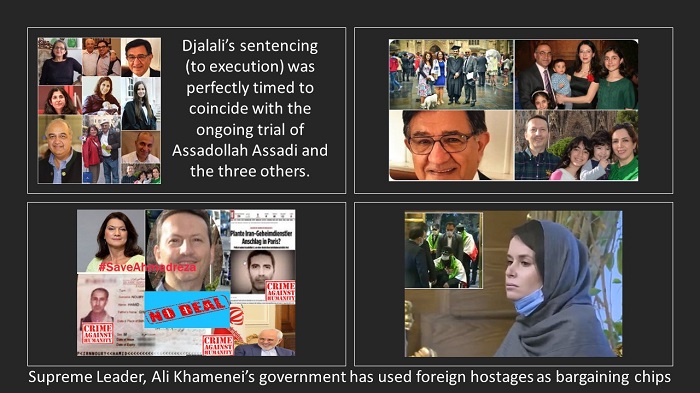
The recent highly publicized release (in Australia, anyway) of a British-Australian academic in Iran has thrown the spotlight on a sordid strategy employed by the Iranian regime.
Supreme Leader, Ali Khamenei’s government has used foreign hostages as bargaining chips before, but in most cases, they had dual Iranian and some other citizenship. Ahmadreza Djalali, the subject of current concern is a prime example. Djalali is an Iranian born Swedish national with citizenships of both countries. Like Kylie Moore-Gilbert (the hostage just released), he is also an academic.
Tehran’s Hostage-Taker State Presses #EU to Release Terrorists
Kylie Moore-Gilbert against 3 Iranian terrorists arrested in Thailand where they had been implicated in a 2012 bomb plot that unsuccessfully sought to target Israeli diplomats. #Terrorism https://t.co/afkJJNXihI— Asef Bazmandeh (@AsefBazmandeh) December 8, 2020
Of course, the Iranian regime does not use the term ‘hostage’ in any of their carefully choreographed utterances. The fiction they maintain is that the hostage was imprisoned for some trumped-up charge, typically espionage. Once the hostage has been arrested, charged, and incarcerated, they remain in one of Iran’s ‘delightful’ prisons like pieces of bait, until such a tie that their release can be exchanged for the release of a genuine terrorist of Iranian nationality who has been held by a foreign government.
Although no-one knows for sure except the Iranians at the top of the food chain in the regime, the fact that four Iranians or dual citizens who were born in Iran are very likely to be charged soon on terrorism charges with sentences probably anywhere between 15 to 20 years for each. How very convenient that now, after Moore-Gilbert was released, there is still Ahmadreza Djalali held on espionage charges and recently sentenced to death.
Ahmadreza Djalali, Another Victim of Tehran’s Hostage-Taking #DisbandIRGC #FreePoliticalPrisoners https://t.co/rcpPNiwDXn via @irannewsupdate1
— Saeed Morad (@saeedseydmorad1) November 26, 2020
Iran’s Foreign Minister, let the cat out of the bag quite recently when he reaffirmed the Iranian regime’s desire to consider ‘prisoner’ exchanges with foreign governments holding Iranian nationals who have committed terrorist attacks or who have been planning or attempting to carry out a terrorist attack.
Kylie Moore-Gilbert’s release, after 2 years of a 10-year espionage sentence, was effected after protracted negotiations between the Iranian, British, Australian, and Thai governments. Moore-Gilbert was basically handed over in exchange for three Iranian nationals from Thai jails who had been imprisoned because of their conviction on bomb plot charges.
The obvious example of the potential new prisoner exchange would be that of Assadollah Assadi, the former Iranian diplomat based in Vienna, as well as three Belgian-Iranians who had been paid by Assadi to carry out a bomb attack on the People’s Mojahedin Organization of Iran (PMOI / MEK Iran), and the National Council of Resistance of Iran (NCRI) Free Iran rally in Villepinte, near Paris at the end of June 2018.
@JZarif @Sophie_Wilmes
Swapping an innocent bargaining chip hostage with terrorists that plotted to kill hundreds, that would be the Art of the Deal! Way to go, Mr. Zarif!#AhmadrezaDjalali #AssadollahAsadi#MedDialogues2020https://t.co/L0852RoKnE— Japan Biking (@JapanBiking) December 3, 2020
The trial of the four Iranian terrorists has already been widely publicized in Europe. The evidence that all four were involved and therefore guilty is relatively clear, although the real culprits, in this case, are in fact those who masterminded the attack yet did not prepare the weapons carefully enough before they were examined by Belgian police.
By contrast, the evidence that any of the recent hostages had any political or criminal motives is basically nil. The charges that have accompanied these foreign dual nationals have always been quite spurious or can be challenged as soon as they are distributed outside of the court.
Moore-Gilbert’s case is slightly different in that the regime’s judicial officials have not attempted to use force or violence on the accused to extract spurious confessions.
We call on members of the international community to immediately intervene, including through their embassies in Tehran, to save Ahmadreza Djalali’s life before it is too late.” #AhmadrezaDjalali Djalali is a hostage in the hand of a criminals, pic.twitter.com/AOibkbu7d9
— Saied Tabrizi ; سعید تبریزی (@IranAufstand) November 25, 2020
Javid Zarifs’s comments are designed for domestic and ‘friendly’ consumption by the regime, whereas more critical foreign observers point out the contradiction between the political reasons and legitimacy of imprisoning the hostages to the reasons and evidence supplied to convict Assadi and his three accomplices.
It is possible that Zarif’s comments have already been noted in Europe where Assadi and co. are being tried. Djalali is the bargaining chip that the regime is prepared to use at the moment. Djalali’s execution has been delayed several times already putting intense psychological pressure on his spouse, family, and colleagues.
The suspicion is that Djalali’s sentencing (to execution) was perfectly timed to coincide with the ongoing trial of Assadollah Assadi and the three others.
and People’s Mojahedin Organization of Iran – MEK IRAN – YouTube







